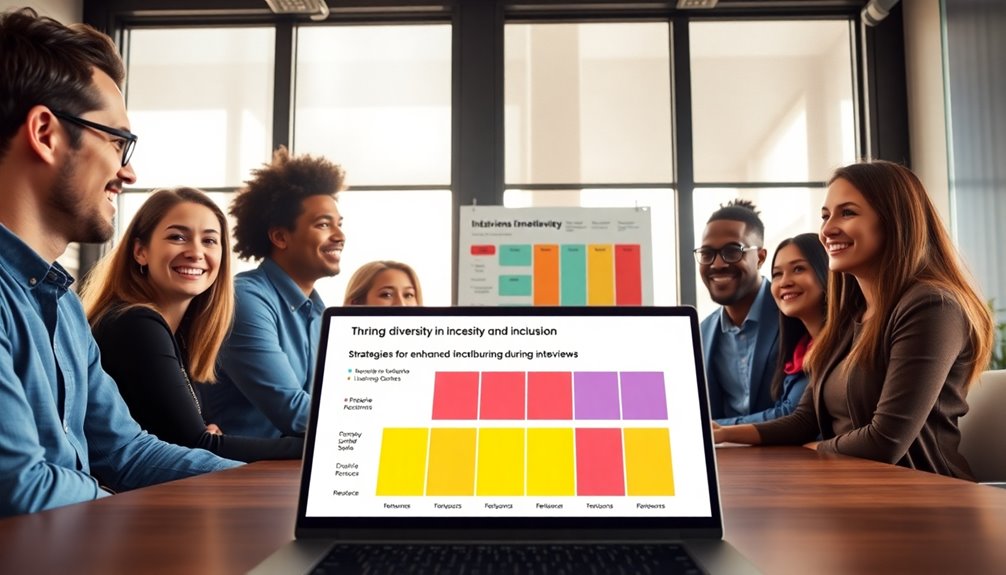To master your general manager interview, focus on key techniques that enhance your preparation and presentation. One game-changing strategy is to tailor your responses using the STAR method, structuring your examples to clearly highlight your accomplishments and fit for the role. Engaging in mock interviews boosts your confidence and helps you fine-tune your answers. Additionally, dressing professionally shows you respect the opportunity and can positively influence first impressions. Remember to ask insightful questions during the interview, demonstrating your interest and critical thinking. Discovering more about these techniques will set you apart from the competition.
Key Takeaways
- Research the company's mission and values to tailor your responses and demonstrate cultural alignment during the interview.
- Use the STAR method to structure answers to behavioral questions, showcasing your leadership experience effectively.
- Prepare specific examples that highlight key competencies from the job description, enhancing your appeal as a candidate.
- Dress professionally and maintain positive body language to create a strong first impression and convey confidence.
- Follow up with a thank-you note, reinforcing your interest and addressing any key points discussed during the interview.
Introduction to Job Interviews

When it comes to job interviews, many candidates feel a mix of excitement and anxiety. Understanding the interview process is crucial. It's not just about answering questions; it's a critical assessment of whether you're a good fit for the position. In fact, over 61% of job seekers consider the interview experience essential to their perception of a company.
Typically, a well-structured interview process includes a recruiter screen, technical assessments, and discussions about culture fit, averaging around 19.45 days from start to finish. To stand out, you need to prepare effectively. Align your experiences with the job description and consider using techniques like the STAR method to articulate your accomplishments clearly.
Building rapport during the interview is vital, too. A warm greeting and engaging conversation can ease your nerves and foster a more open dialogue. Remember, continuous feedback and transparency during the interview process not only enhance your experience but also reflect positively on the company. Candidates often share their experiences with peers, so making a strong impression is essential. Embrace this opportunity to show why you're the best candidate for the general manager role! Additionally, focusing on positive customer experiences can significantly enhance your interview performance by demonstrating your understanding of business dynamics.
Preparing for the Interview

To ace your general manager interview, you need to focus on research and self-assessment. Make sure you tailor your resume and application to highlight relevant experiences, and prepare for various interview techniques. This preparation will boost your confidence and help you make a strong impression. Additionally, showcasing your strong communication skills can significantly enhance clarity and build rapport with interviewers.
Research and Self-Assessment
Thorough research and self-assessment are crucial steps in preparing for a general manager interview. Start by diving deep into the company's mission, values, and recent developments. This knowledge helps you tailor your responses, showing your alignment with the organization. Analyze the job description closely to pinpoint key responsibilities and required competencies. By doing this, you can prepare specific examples from your experience that highlight your qualifications.
Utilize online resources like Glassdoor and LinkedIn to gain insights into the company culture, interview experiences, and employee feedback. This will enrich your understanding of the organization and provide context for your answers.
Equally important is performing a self-assessment. Identify your strengths, weaknesses, and areas for growth. This enables you to articulate your value proposition effectively and address any potential concerns during the interview.
Don't forget to prepare thoughtful questions for the interviewer. These should reflect your research and self-assessment, demonstrating your genuine interest in the role and allowing for a more engaging conversation. By combining thorough research with honest self-assessment, you'll set yourself up for success in your general manager interview.
Resume and Application Preparation
A well-crafted resume is vital for making a strong impression in your general manager interview. Start by tailoring your resume to highlight experiences and accomplishments that align with the specific competencies in the job description. Use the STAR method—Situation, Task, Action, Result—to structure examples of your leadership experiences, showcasing your ability to manage teams and drive results effectively.
Don't forget to research the company's mission and values. Incorporating insights about their recent achievements into your application can demonstrate your alignment with their organizational culture and strategic goals. When detailing your past roles, quantify your achievements with specific metrics like revenue growth or cost reductions. This approach helps you stand out as a results-driven candidate.
Lastly, ensure your application is free from errors and formatted professionally. Attention to detail reflects your organizational skills and commitment to excellence—qualities essential for a General Manager. Additionally, consider how your past experiences in creating a retirement savings plan can contribute to your financial acumen as a leader in the organization. Remember, your resume is your first opportunity to answer job interview questions before you even step into the room. Make it count!
Interview Preparation Techniques
Preparing for your general manager interview goes beyond crafting a standout resume; it's about honing your approach to the interview itself. Start by familiarizing yourself with common competency-based questions and practicing your Behavioral Interview Answers using the STAR method (Situation, Task, Action, Result). This structure helps you present your experiences clearly and effectively.
Next, dive deep into researching the company's values, mission, and the job description. Align your experiences with the key competencies that the employer seeks, ensuring your responses resonate with their expectations. Prepare a list of impactful work experiences that showcase your problem-solving, leadership, and adaptability skills. These will enhance your narrative during the interview.
Engaging in mock interviews can significantly boost your confidence. They allow you to refine your answers and receive constructive feedback, improving your overall interview experience. Lastly, develop thoughtful questions to ask your interviewer. This demonstrates your genuine interest in the role and shows you're ready to address any concerns they might have about your application. With these interview preparation techniques, you'll be well-equipped to make a lasting impression.
Dressing for Success

When you're preparing for a General Manager interview, your attire plays a crucial role in shaping first impressions. You'll want to follow some general guidelines while considering gender-specific tips and the seasonal context of your outfit. Dressing appropriately not only showcases your professionalism but also aligns with the company culture, making a strong statement before you even say a word.
General Attire Guidelines
Dressing for success in a general manager interview is crucial to making a positive first impression. Choosing professional attire that aligns with the company's culture can significantly enhance how interviewers perceive your professionalism. Studies show that candidates dressed in tailored suits or business attire in neutral colors are often seen as more competent and confident.
Grooming and personal hygiene also play a vital role. A well-groomed appearance reflects your attention to detail and commitment to the position, as 65% of interviewers believe. When it comes to accessories, keep them minimal and tasteful; over-the-top jewelry can distract from your qualifications. In fact, 58% of hiring managers note that excessive accessories can detract from professionalism.
Lastly, don't overlook your shoes. Ensure they're polished and appropriate for the business setting, as footwear choices are often scrutinized. About 50% of interviewers indicate they notice candidates' shoes during the interview process. By focusing on these general attire guidelines, you'll position yourself as a strong candidate, ready to take on the responsibilities of a general manager.
Gender-Specific Attire Tips
Navigating gender-specific attire for a general manager interview can greatly impact your chances of making a lasting impression. To ensure you align with what hiring managers expect, consider these tailored suggestions.
For men, a well-fitted suit in neutral colors like navy or charcoal is ideal. Pair it with a crisp dress shirt and a conservative tie; about 60% of hiring managers prefer traditional business attire for leadership roles. Women should opt for tailored suits or professional dresses, steering clear of overly casual or revealing outfits. Research indicates that 55% of female candidates feel more confident in business formal attire during interviews.
Keep accessories minimal and professional. Men can enhance their look with a classic watch, while women should choose subtle jewelry that complements, rather than distracts from, their outfit. Footwear also plays a crucial role in your overall appearance. Men should wear polished dress shoes, while women can select closed-toe heels or flats. Proper footwear adds to a polished look that aligns with leadership expectations. By dressing appropriately, you'll not only impress hiring managers but also boost your own confidence during the interview.
Seasonal and Casual Attire
Making a strong impression during a general manager interview involves choosing the right seasonal and casual attire that reflects both your professionalism and the company culture. Dressing appropriately is crucial, as 61% of job seekers believe the interview experience is critical, and first impressions often hinge on appearance.
In warmer months, opt for lighter fabrics that keep you comfortable while maintaining a polished look. In winter, layered outfits not only demonstrate your adaptability but also your understanding of the organizational environment. Casual attire can be acceptable in some industries, but it should still exude professionalism. Tailored pants paired with a smart blouse or button-up shirt strike the perfect balance between comfort and professionalism.
When accessorizing, keep it minimal yet thoughtful. A classic watch or simple jewelry can enhance your overall appearance without being distracting. Before the interview, research the company's dress code to ensure your attire aligns with both your personal style and the professional expectations of the organization. By dressing appropriately, you'll convey confidence and readiness for the role, making a lasting impression on your interviewers. Additionally, understanding the importance of cookies on websites can enhance your digital presence, which is increasingly relevant in today's job market.
Mastering Interview Questions

When it comes to mastering interview questions, you'll want to focus on common inquiries, behavioral and situational scenarios, and even industry-specific challenges. Understanding advanced questioning techniques can also set you apart from other candidates. By preparing effectively, you'll not only answer questions with confidence but also showcase how your experiences align with what the hiring manager is looking for.
Common Interview Questions
Preparing for a General Manager interview often feels like gearing up for a high-stakes performance. You should anticipate common interview questions that delve into your leadership style, conflict resolution skills, and strategic decision-making abilities. Interviewers want to see how you've tackled challenges in your previous roles, so be ready to share specific examples.
Competency-based questions are prominent, and employing the STAR method (Situation, Task, Action, Result) will help you articulate your experiences effectively. Research the company beforehand to align your responses with their values and culture; this shows your genuine interest and fit for the organization. Additionally, preparing for potential speaking engagements can enhance your overall presentation skills, as the nature of great speakers often impacts how you communicate your ideas. Understanding basic financial terms can also provide a useful context for discussing budget management in your role.
Expect questions about managing diverse teams and driving performance metrics. Highlight past successes in team leadership and operational efficiency to demonstrate your capability. Additionally, be prepared to discuss your approach to change management and innovation, as these topics often arise in senior management interviews. They reflect an organization's commitment to growth and adaptability. Incorporating data-driven insights into your strategic planning can significantly enhance your decision-making process.
Behavioral and Situational Questions
Understanding behavioral and situational questions is key to acing your General Manager interview. Behavioral questions focus on your past experiences to predict how you'll perform in the future. Interviewers often ask about teamwork, decision-making, and conflict resolution. To tackle these effectively, use the STAR method (Situation, Task, Action, Result) to structure your answers, ensuring clarity and relevance.
Situational questions, on the other hand, present hypothetical scenarios to assess your problem-solving skills and decision-making under pressure. You should prepare specific examples that highlight the key competencies outlined in the job description, as this enhances your answers' relevance during the interview.
Practicing responses to common behavioral and situational questions can significantly boost your confidence and improve your overall performance. Think about your previous experiences and how they relate to the role. By honing your storytelling skills with the STAR method, you can deliver compelling narratives that resonate with interviewers. Remember, the more you prepare, the more at ease you'll feel during the interview. So, take the time to rehearse, and you'll find yourself ready to impress with your insights and experiences.
Industry-Specific Questions
Mastering industry-specific questions can set you apart in a General Manager interview, showcasing your expertise and insight into the sector. These questions often focus on key competencies like leadership, strategic planning, and operational efficiency—crucial for a General Manager's success. To excel, familiarize yourself with market trends and the competitive landscape, as this knowledge can significantly enhance your responses.
Be ready to discuss real-world challenges you've faced in your industry and how you navigated them. Concrete examples highlight your problem-solving abilities and demonstrate your hands-on experience. Tailoring your responses to reflect the unique challenges and goals of the company can make you memorable during the interview process.
When answering industry-specific questions, utilize the STAR method (Situation, Task, Action, Result). This structured approach allows you to effectively showcase your relevant experiences and competencies. By preparing in this way, you'll not only answer the questions but also convey a strong understanding of what it takes to thrive in the role. Focus on these strategies, and you'll be well-equipped to impress your interviewers with your industry knowledge and managerial skills.
Advanced Question Techniques
Effective interview techniques can significantly elevate your ability to evaluate candidates for a General Manager position. One key strategy is to employ advanced question techniques, such as situational and behavioral questions. These approaches help you assess candidates' problem-solving abilities and decision-making skills, which are crucial for success in this role.
Utilize the STAR method (Situation, Task, Action, Result) to structure your questions. This framework encourages candidates to provide relevant, detailed responses that showcase their competencies. For example, ask them to describe a time when they led a team through change. This not only reveals their experience but also highlights how they might approach similar challenges in your organization.
Tailoring your questions to align with the specific competencies outlined in the job description is essential. Focus on behavioral questions that uncover how candidates have tackled past challenges, offering valuable insights into their potential future performance. By integrating these advanced question techniques into your interview process, you'll gain a clearer picture of each candidate's suitability for the General Manager position, ensuring you make informed, effective hiring decisions. Additionally, fostering an environment of open communication can enhance the overall interview experience and build rapport with candidates.
Asking Insightful Questions

Asking strategic and closing questions during your general manager interview can set you apart from other candidates. These questions not only showcase your understanding of the role but also give you insights into the company's culture and expectations. By engaging in this dialogue, you can effectively advocate for your fit within the organization and address any potential concerns.
Strategic Questions to Impress
During a General Manager interview, the questions you pose can set you apart as a standout candidate. By asking strategic questions, you demonstrate your critical thinking skills and genuine interest in the company's challenges and goals. Inquire about specific organizational challenges or strategic priorities; this not only showcases your understanding of the role's impact but also positions you as someone ready to tackle real issues.
Engaging in dialogue about the company's culture and team dynamics is equally important. It helps you assess your fit while showing your commitment to fostering a positive work environment. Proactively asking about key performance indicators (KPIs) and success metrics reflects your readiness to contribute to the organization's objectives and aligns you with its vision. Understanding the importance of self-care practices can also enhance your ability to manage stress during the interview process, which is vital for making a strong impression.
Finally, don't shy away from discussing opportunities for professional development and team collaboration. This signals your dedication to continuous improvement and leadership growth, making a strong impression on interviewers. By integrating these strategic questions into your interview, you'll not only gather valuable insights but also leave a lasting, positive impression. Additionally, understanding the importance of content variety can help you create a diverse set of questions that resonate with the interviewers.
Closing Questions
As your interview wraps up, the questions you pose can significantly influence the impression you leave. Closing questions are your chance to demonstrate engagement and enthusiasm for the role. Research shows that 61% of job seekers value the interview experience highly, so make your conversation stand out.
Inquire about the company's future goals or challenges. This not only shows your interest but also highlights your strategic thinking and understanding of the business landscape. Asking about team dynamics or company culture provides you with valuable insights and reflects your desire for a harmonious work environment.
Additionally, don't shy away from addressing any concerns the interviewer may have about your fit for the role. This proactive approach can turn potential hesitations into reassurances, strengthening your candidacy.
Effective Communication and Presentation

Effective communication and presentation can make or break your General Manager interview. You need to craft responses that are not only clear but also confident, using body language to reinforce your message. Remember, how you present yourself matters just as much as what you say.
Crafting the Perfect Response
Often, crafting the perfect response in a General Manager interview hinges on your ability to communicate clearly and confidently. One effective way to structure your answers is by using the STAR method—Situation, Task, Action, Result. This approach helps you focus on key competencies relevant to the role while ensuring clarity.
When responding to questions, practice active listening. By truly hearing what the interviewer is asking, you can provide thoughtful answers that demonstrate your engagement with their concerns. Tailoring your responses to align with the company's values and mission is crucial. Show how your past experiences support the organization's goals and culture.
Additionally, prepare specific examples that illustrate your skills and achievements. This preparation not only showcases your qualifications but also reinforces your understanding of the role. Remember to maintain positive body language and eye contact throughout the interview. This will convey confidence and professionalism, aspects that significantly influence the interviewer's perception of your suitability.
Lastly, don't hesitate to ask thoughtful questions of your own. This indicates your interest in the position and proactive approach to understanding the company's challenges and opportunities.
Body Language and Confidence
Mastering body language can significantly elevate your confidence during a General Manager interview. Positive body language, like maintaining eye contact and adopting an open posture, makes you look more approachable and engaged. When you demonstrate confidence through a firm handshake and purposeful movements, it positively influences how interviewers perceive you, enhancing your overall impression. Remember, studies show that non-verbal communication accounts for about 93% of the message you convey, highlighting the importance of body language in communicating competence and assurance.
To prepare, practice power poses before your interview. Research suggests that adopting expansive body language for just two minutes can boost your feelings of power and reduce stress levels. Consistent practice of confident body language during mock interviews can also help you reduce anxiety and improve your performance. Focus on your body language, and it'll not only convey your confidence but also help you feel more assured throughout the interview process. By mastering these techniques, you'll be well-equipped to make a lasting impression and increase your chances of success in landing that General Manager position.
Post-Interview Strategies

After your interview, it's crucial to follow up effectively to reinforce your interest and stand out to the hiring team. Consider sending a thank-you note within 24 hours, along with a brief email that highlights key discussion points. Additionally, knowing how to handle offers and rejections gracefully can set the stage for future opportunities.
Follow-Up Communications
Although you've aced the interview, your efforts shouldn't end there. Follow-up communications are crucial in solidifying that positive impression. Send a thank-you note within 24 hours, as 61% of job seekers appreciate a good interview experience. In your note, reiterate your interest in the position and highlight key points discussed during the interview. This not only reinforces your suitability but also keeps you fresh in the hiring manager's mind.
If any questions or concerns were raised during the interview, address them in your follow-up. Demonstrating proactive behavior showcases your commitment to the role and the organization. Maintaining professional connections post-interview can also open doors for future opportunities, as your candidate experience influences the employer's brand reputation.
Additionally, providing feedback on your interview experience, when appropriate, can foster a culture of continuous improvement within the organization. This reflects well on your professionalism and can leave a lasting impact. Remember, follow-up communications are more than just a courtesy; they're a strategic move in your job search that can set you apart from other candidates.
Handling Offers and Rejections
Receiving a job offer can be exhilarating, but it's vital to approach it thoughtfully. Start by expressing gratitude and enthusiasm to the employer, but don't rush into a decision. Evaluate the offer against your career goals and market standards. This careful reflection helps ensure you're making the best choice for your future.
If you face a rejection, don't be discouraged. Consider reaching out to the interviewer for constructive feedback. Many candidates appreciate this insight, which can help you improve for future opportunities. In fact, 70% of candidates value receiving such feedback. Even if you didn't get the job, sending a thank-you note can leave a positive impression. With 61% of job seekers noting that positive experiences influence their perception of the employer brand, this small gesture can go a long way.
Finally, keep the lines of communication open. Maintaining contact post-interview keeps you in consideration for future openings; 50% of candidates report being contacted later for new opportunities. Reflecting on your interview performance can also enhance your chances in subsequent interviews, as 80% of candidates find that self-reflection leads to better preparation.
Diversity and Inclusion Strategies

When you're preparing for interviews, understanding remote interview technology can help you connect with candidates from diverse backgrounds. You'll also want to consider the cultural nuances in communication, as they play a crucial role in how candidates express themselves. Plus, exploring emerging interview techniques can enhance your diversity and inclusion strategies, ensuring you attract top talent.
Remote Interview Technology Insights
Harnessing the power of technology in remote interviews can significantly enhance diversity and inclusion strategies within your hiring process. As remote interviews become more common, it's crucial to ensure a positive experience for candidates. Research shows that 61% of job seekers prioritize this aspect, which can be achieved through thoughtful use of technology.
Implementing diverse and inclusive remote interview practices helps reduce unconscious bias, allowing you to evaluate candidates based solely on skills and qualifications. Utilizing standardized video interview platforms promotes uniform assessments, fostering a more equitable selection process. This approach reduces the risk of bias, ensuring a fair evaluation for all candidates.
Moreover, effective remote interview technology facilitates smoother communication and real-time collaboration among your hiring team. This capability encourages inclusive discussions and evaluations, allowing for varied perspectives from team members with different backgrounds. Ultimately, prioritizing diversity and inclusion not only attracts a broader talent pool but also boosts innovation and company performance. By leveraging remote interview technology insights, you can enhance your hiring process and create a more inclusive environment, setting your organization up for success.
Cultural Nuances in Communication
Cultural nuances in communication play a vital role in fostering effective engagement within diverse workplaces. Recognizing these nuances is essential, as 70% of organizations see cultural intelligence as a key factor in team performance. You'll need to adapt your communication strategies to accommodate various styles. For instance, high-context cultures often rely on implicit messages, while low-context cultures prefer directness.
Implementing diversity and inclusion strategies can significantly enhance team collaboration. Research shows that diverse teams are 35% more likely to outperform their homogeneous counterparts. To facilitate this, practice active listening in cross-cultural settings. This skill helps you understand and appreciate different perspectives, fostering a more inclusive environment.
Bridging communication gaps is crucial, so consider advocating for training on cultural sensitivity within your organization. A striking 83% of employees believe such training improves workplace relationships and teamwork. By embracing cultural nuances in communication, you not only prepare yourself for a successful general manager interview but also position yourself as a leader who values diversity and inclusion. This approach can set you apart, making you a more appealing candidate for any organization committed to fostering a vibrant, multicultural workforce.
Emerging Interview Techniques
A growing number of organizations are adopting innovative interview techniques to enhance diversity and inclusion in their hiring processes. By implementing a structured approach, you can significantly reduce unconscious bias and ensure all candidates are evaluated fairly. Using standardized questions helps create uniformity, allowing for direct comparisons between candidates while promoting an equitable environment.
Pre-employment assessments are another emerging interview technique that objectively evaluates job-related skills, showcasing diverse strengths and weaknesses. This method not only widens the candidate pool but also fosters inclusivity. As you engage in active listening during interviews, you'll appreciate various perspectives, enhancing the overall candidate experience and encouraging open dialogue.
Crafting custom interview questions based on candidates' backgrounds can reveal unique experiences, further promoting a diverse workforce that embodies varied viewpoints and ideas. Finally, commit to continuous improvement by training on diversity and inclusion strategies. This equips you and your hiring managers with the necessary skills to create a welcoming atmosphere for all candidates. By embracing these emerging interview techniques, you'll not only improve your hiring process but also support a culture that values diversity and inclusion.
Confidence and Mindset

Confidence is crucial in interviews, and building unshakeable confidence starts with preparation. By practicing your responses and using visualization techniques, you can inspire yourself to face the interview with a growth mindset. Remember, seeing challenges as opportunities not only boosts your confidence but also sets you up for success.
Building Unshakeable Confidence
Building unshakeable confidence is crucial for excelling in general manager interviews. Your confidence level significantly impacts how interviewers perceive you, so it's essential to prepare thoroughly. Practicing your interview responses and visualizing successful scenarios can help reduce anxiety and boost your overall performance.
Adopting positive body language is vital; maintaining eye contact and using open gestures can create a confident demeanor that resonates well with interviewers. Additionally, familiarizing yourself with common interview questions and understanding the company's expectations will build your confidence, allowing you to articulate your experiences and competencies effectively.
Engaging in self-reflection and seeking feedback from previous interviews can further enhance your confidence. By identifying your strengths and areas for improvement, you foster a growth mindset, which is essential for building unshakeable confidence. Remember, the more prepared you are, the more self-assured you'll feel during the interview.
Inspirational and Motivational Strategies
Mastering the right mindset can elevate your performance during a general manager interview. To build confidence, thorough preparation is key. It not only deepens your understanding of the role but also boosts your self-assurance. Combine this with positive body language—maintaining eye contact and an open posture—to project confidence and make a lasting impression on your interviewers.
Incorporating visualization techniques can be an inspirational practice. Imagine yourself succeeding in various interview scenarios; this can significantly reduce anxiety and reinforce a confident mindset. Mock interviews with peers or mentors serve as motivational exercises, allowing you to refine your responses and gain valuable feedback, which ultimately enhances your confidence.
Researching the company culture and aligning your personal values with their organizational goals is crucial. When you genuinely believe in your fit for the role, it fosters a more confident demeanor in your interview. Embrace these strategies, and you'll not only feel more prepared but also inspired. Remember, confidence isn't just about knowing the answers; it's about believing in yourself and your ability to lead. Stay motivated, and you'll shine in your general manager interview.
Use a Mock Interview

Using a mock interview can be a game-changer as you prepare for your general manager interview. It lets you practice your responses and receive constructive feedback, helping you refine your approach and boost your confidence. By simulating different interview scenarios, you'll be ready to tackle any situation that comes your way.
Essential Items and Preparation
A mock interview serves as an invaluable tool for preparing for a general manager position. By simulating real interview conditions, you can practice your responses and receive constructive feedback on your performance. To make the most of this opportunity, utilize the STAR method to structure your answers. This ensures clarity when discussing specific examples from your past experiences that relate to the general manager role.
Before the mock interview, prepare specific examples showcasing your leadership, decision-making, and strategic planning skills. These examples will help illustrate your competencies and give depth to your responses. Enlist a peer or mentor as your interviewer; their fresh perspective can highlight your communication style and pinpoint areas for improvement.
Record the session to review your body language, tone, and delivery. Watching yourself can reveal nuances you may not notice in the moment, allowing you to refine your presentation skills. This preparation will boost your confidence and polish your performance, making you more effective in the actual interview. By investing time in a mock interview, you're setting yourself up for success in landing that general manager position.
Final Preparation Steps
Conducting a mock interview is essential for final preparation before your general manager interview. This practice simulates the real interview environment, allowing you to hone your responses and refine your delivery under pressure. Enlist the help of peers or mentors to provide feedback during these sessions. Their insights will help you identify strengths and weaknesses in your communication and presentation skills.
Focus on common questions tailored to general manager roles. Prepare for leadership scenarios and strategic decision-making examples. These topics are often central to your interview. Recording your mock interviews can be incredibly beneficial. Analyzing your body language, tone, and pacing will reveal how you might be perceived by interviewers, enabling you to make necessary adjustments.
Structured Interview Framework

Structured interview frameworks are often the backbone of effective candidate assessments, providing a systematic method to evaluate skills and competencies. By employing standardized questions, you can focus on job-related criteria that truly matter. This not only streamlines the interview process but also ensures consistency in how you assess each candidate.
Building rapport is crucial; 61% of job seekers consider it critical to their impression of your organization. As you engage with candidates, remember to practice active listening. This allows you to fully grasp their responses, leading to more informed hiring decisions.
Incorporating situational and competency-based questions within your structured interview framework helps you evaluate candidates' problem-solving abilities and relevant experiences effectively. This targeted approach sets the stage for a deeper understanding of how candidates might perform in the role.
Lastly, don't overlook the importance of continuous improvement. Regular training on structured interview techniques can refine your skills and enhance the overall candidate experience. By mastering this framework, you'll position yourself to make better hiring choices that align with your organization's goals.
Summarize Interview Preparation Essentials

Preparing for a General Manager interview requires a strategic approach that aligns your qualifications with the company's needs. Start by thoroughly researching the company's values, mission, and recent developments. This knowledge allows you to tailor your responses to demonstrate alignment with their goals and culture.
Next, anticipate common interview questions specific to General Manager roles. Expect inquiries about team management, strategic planning, and conflict resolution. Practicing your responses in advance will help you articulate clear and concise answers. Utilize the STAR method—Situation, Task, Action, Result—to structure your responses for behavioral questions. This technique showcases your relevant experiences effectively and highlights your problem-solving skills. Additionally, be prepared to discuss your experience in driving business growth, optimizing operations, and fostering a positive work culture. Emphasize your ability to lead and motivate a team, as well as your track record in achieving and exceeding KPIs. These gamechanging interview secrets will set you apart from other candidates and demonstrate your readiness for the General Manager role.
Additionally, prepare a list of impactful work experiences that align with key competencies required for the role, such as leadership and decision-making. Finally, don't forget to follow up with a thank-you note after the interview. Expressing appreciation and reiterating your interest can positively influence the hiring manager's perception of you. By following these essential preparation steps, you'll enhance your confidence and increase your chances of success in the interview process.
Encouragement and Final Thoughts

Embracing the interview process can be a transformative experience, as it not only highlights your qualifications but also offers a chance to showcase your personality and vision. Remember, every interview is a learning opportunity. You're not just being evaluated; you're gaining valuable insights into what hiring managers seek.
Encouragement is key. As you engage with interviewers, build rapport, and share your experiences, you'll create a comfortable environment that fosters open communication. This approach not only eases your nerves but also allows you to express your true self.
Don't forget the importance of receiving feedback. Whether you land the job or not, constructive feedback helps you refine your skills for future interviews. A simple thank-you note after your interview demonstrates your appreciation and keeps the lines of communication open, enhancing your overall candidate experience.
Lastly, continuous improvement in your interview techniques can significantly boost your confidence and effectiveness as a candidate. Remember, the process may be challenging, but it's also an opportunity for growth. Embrace it, learn from it, and keep pushing forward. You've got this!
Frequently Asked Questions
How to Pass a General Manager Interview?
To pass a general manager interview, you need to prepare thoroughly. Familiarize yourself with the company's mission and recent developments, so you can tailor your responses. Use the STAR method to structure your answers, showcasing your leadership skills. Be ready for strategic thinking questions, and highlight your experience in cross-departmental collaboration. Lastly, don't forget to send a thank-you note afterward, reiterating your interest and reflecting on key points discussed during the interview.
What Are the Five C's to Remember in an Interview?
In an interview, remember the Five C's: Clarity, Confidence, Competence, Connection, and Closure. You need to express your thoughts clearly, ensuring your answers are structured. Show confidence by being well-prepared, which helps interviewers see your suitability. Highlight your competence through relevant achievements. Build a connection by actively listening and engaging with the interviewer. Finally, wrap up with closure by summarizing your interest in the role and thanking them for the opportunity.
What Is the CBI Method of Interview?
The CBI method, or Competency-Based Interviewing, focuses on your past behaviors to predict your future performance. You'll often use the STAR method—Situation, Task, Action, Result—to structure your answers effectively. Employers appreciate this approach because it evaluates key competencies like teamwork and problem-solving. To excel, analyze job descriptions to identify necessary skills and tailor your responses accordingly, showcasing relevant experiences that align with the role.
What Is the STAR Method When Interviewing?
The STAR method is a powerful interview technique that helps you structure your responses effectively. It stands for Situation, Task, Action, and Result. When you use this method, you describe a specific situation you faced, the tasks you were responsible for, the actions you took to address challenges, and the results of those actions. This approach not only showcases your problem-solving skills but also boosts your confidence and clarity during interviews.









